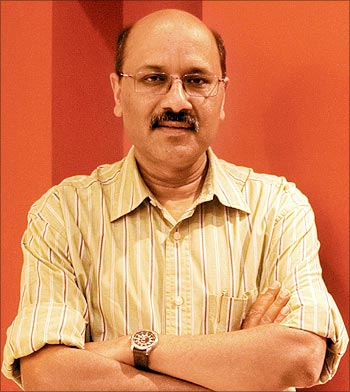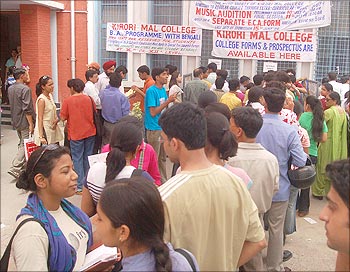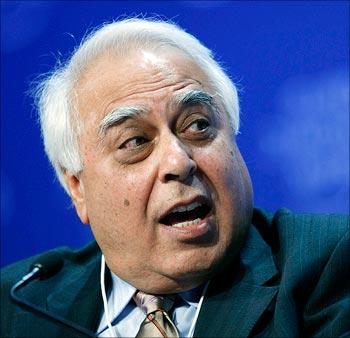 | « Back to article | Print this article |
'I am among the HMTs: Hindi Medium Types'
Shekhar Gupta, who heads The Indian Express Group, is one of the most recognisable faces of Indian media. His entry into journalism happned by chance. It showed him an alternative that was more attractive than botany. The assiduous journalist, whose life took a definitive turn while covering northeast insurgency, feels that education is a specalised area and media is on a learning curve when it comes to covering this sector. Excerpts from an interview with Urmila Rao, in which he gives glimpses of his modest schooling and shares his opinion on the reform measures that can be adopted by the sector.
Q: Do you feel that the aspirations and hopes of today's youth are markedly different from that of your college days?
A: Yes, of course. In my time or even till 15 years back, the primary job provider was the government. So a majority did NDA (National Defence Academy), IMA (India Military Academy) or gave Bank Probationary Officers' exam, studied for IAS (Indian Administrative Service) etc. Now job prospects are enormously more. At the same time, the number of people seeking jobs has also increased because a lot more are getting educated. So the demand of professional education or specalised education has risen very rapidly.
Q: What did you study?
A: When I went to college in the mid '70s, we had no choice (of courses). Science was the first preference. If you were not good enough for biology, then you did engineering. Those days engineering jobs were only in the government sector. So, I was forced to study biology. Not that I had great interest in it. I enjoyed some of it but I don't think I would have made a great doctor or even a good doctor. In any case, I didn't have the patience to study seven more years after graduation in biology, in which I got very good marks.
Q: In that case how did you get into journalism?
A: Quite providentially. I had gone to Punjab University with which my college was affiliated to, to get the spelling of my name corrected on the mark sheet. My name had an additional "i", so the name was 'Sheikhar'. There I spotted a little notice on admission tests for a journalism course. So I just filled the form and sat for it and got selected.
Q: How was it studying in school?
A: I went to many schools but below ordinary schools. My father was in the Punjab government. He was an honest government employee and so he used to get transferred every few months. So my schooling happened in cities that were punishment postings in the '60s. I studied in places like Palwal, Bhatinda, Sirsa and Rohtak. Most schools had no rooms. Most of the year, classes were held under trees. Blackboards were kept on props. And these were all Hindi medium schools. I call myself among the HMTs- 'Hindi Medium Types'.
Q: Why is it that media doesn't pursue education-related stories with much vigour?
A: I think it is a new field for the media. It is like about 25 years ago, it didn't know how to cover business and economics. TN Ninan of 'India Today' had covered a story on how London-based businessman Swaraj Paul mounted a takeover bid on Escorts and DCM. Its coverage style redefined the way business was covered in the Indian media. I think something similar has to happen with covering of education which is a specialised business. Right now the only coverage is on politics of education and policies. There is a lot of advertising from education business and so it has acquired a certain degree of clout in the media. But it will be sorted out soon.
Careers360 is a complete career magazine
'Don't just spend your money to get a degree'
Q: A lot of students base their admission decisions believing the claimsmade in adverts appearing in responsible media. Should the media run such misleading adverts?
A: I think everybody is on a learning curve. There is a lot of exaggerated claim. That is also because we never allowed the private sector to develop in the proper way. A lot of people have grown in the sideways manner by cutting corners. Education sector needs most of all, a very good regulation. Students should verify the colleges, the placement records. Don't just spend your money to get a degree.
Q: What role can media play in bid to reform the education system?
A: I think media now has to start covering education business as they would cover almost as seriously as health-related issues. Education concerns all three generations of people. We are trying and doing that in our paper as well.
Q: Allow me to ask you a personal question. If you had access to upscale schools do you think your life would have been any different?
A: Well, I don't know. But certainly some of things would have come easier. You just have to work extra hard for everything. A sense of proving is there. But at the same time when you gothrough hard schooling in countryside, it also hardens you a great deal and gives you a thick skin which is very important in this line. If you go back to '60s and mid '70s, there was no internet, mobile phones or trunk calls. So there was disadvantage not only in going to very basic schools, but also the disadvantage of being in small towns.
Q: It is alleged that marketing and not editorial has a greater role to play as far as education-related stories are concerned. Is it true?
A: In 'The Express Group' there is no such issue. I think also in most papers, if a reporter came out with a really brilliant story which is adverse to the institution, the paper will publish it even if the institution is a big advertiser. I think it is really difficult to stop a big story. I feel journalists have to acquire better competence in this area.
Q: What would you like to highlight in your paper?
A: We will fight for better quality and more quantity. The big problem in India is the quantity; there is massive undersupply (of educational institutions). We must first address the under-supply. A regulator can be set up in one week. Where is the problem with that? There should be a good professional, committed regulator for education. Let the thousand flowers bloom!
'Some rankings do look sponsored'
Q: When you did your show 'Walk the Talk' on NDTV with Mr. Kapil Sibal, the HRD minister, what sense did you derive after the conversation?
A: There are very good intentions. But to get something done in the government system, you have to back the intentions with a lot of skill; skill of manoeuvring with the political system, bureaucratic system, public opinion. All that now remains to be done. It can't be done in the government sector neglecting the private sector and foreign institutions. And the change should take place in a systematic manner with proper regulation so that fly-by-night act could be stopped.
Q: What is your take on the rankings done by various publications and the electronic media?
A: These things have to be done fairly and there is a scientific way of doing it. I don't think all the rankings that you see in India are fixed. But some do look sponsored. I can assure you that when we do it, no sponsors who are advertising will have anything to do with it.
Q: Your one advice to the minister with regard to education reform?
A: Don't delay change. That longer the change is delayed, the more resistance develops in the system. Now everyone pretty much knows his mind. So all the vested interests and rent-seekers who do not want change will now be working very hard, blocking change.
Q: Every one has a defining moment that changes the entire course of life. What was yours?
A: Going to the northeast. In January '81 I went there at the height of trouble. Like every journalist has to pay his dues doing something, I paid mine covering the northeast assignment. It gave me exposure and brought about a quantum change in the quality of work that I was doing.


